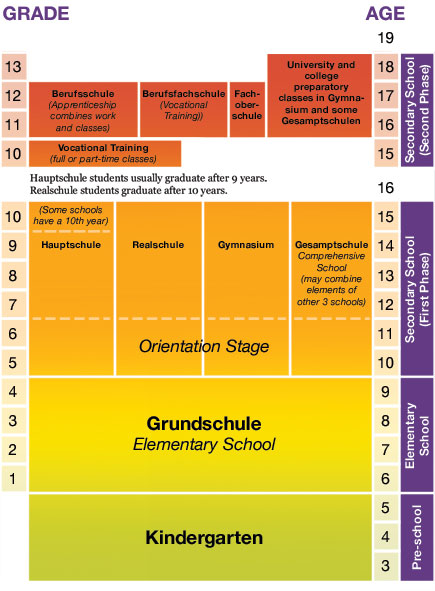Over the past school year, I attended a German secondary school and encountered many experiences that are vastly different compared to an American high school. However, from my point of view, both systems have their flaws. The article in the link above is written from a standpoint of an educator and this article is written from a student standpoint.

Source: Demystifying the German educational system
In the United States, the public school system is rather simple. Children typically begin education at the kindergarten level and they attend the public school their municipality offers. Students are not sorted into different schools at any point between first grade and twelfth grade. In addition, institutions of tertiary education within the American education system tend to only evaluate grades in high school (9-12 Grades), therefore grades before ninth grade are technically unessential and it is only a readiness indicator for high school.
In Germany, the system is a bit more complicated. Children within the same municipality do not always attend the same school as one another because they are sorted into different schools based on ability levels beginning in fifth grade. Due to the ability level sort starting at fifth grade, grades actually matter in the long term at a much younger age within the German system.
Contrary to the article, my opinion is that the structure of the American education system is better than the German education system because it essentially allows students to have a clean slate going into high school.
Some people may question why having a clean slate in ninth grade is important, but my answer to this would be because educators need to put students on a fair playing field. Kids mature at different times than one another, especially boys versus girls. The German education system diminishes the potential of students that are simply maturing at a later point in their childhood. This is a major flaw within the German educational system.
In addition to the point regarding maturity, I believe that children between the ages of 9 and 10 are not ready to undertake stress. Some will be pressured by parents to study hard and to forget the essentials of being a kid due to the long-term ramifications of being sorted into a lower level school. In my point of view, being a kid is special because it is the one point in your life when you can be carefree, such as having no bills to pay and having very little responsibilities. This only happens once in a lifetime. Within the German educational system, childhood experiences are reduced.
All in all, this is not just a German problem. In general, educational systems around the world have a more similar structure to Germany than the United States. Many Americans take the American education system for granted and fail to realize that America's educational structure is actually very unique relative to the rest of the world. Not every country in the world has an educational environment where children CAN be children.
No comments:
Post a Comment